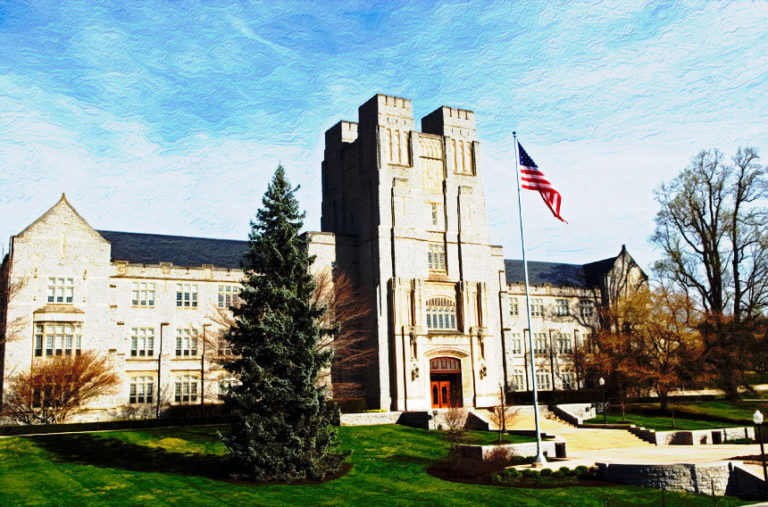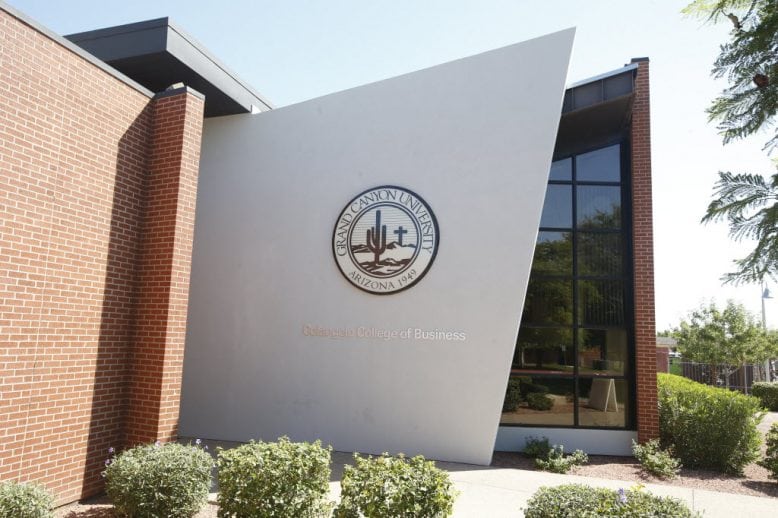We have ranked the Best Master's in Educational Technology degrees for online students to make informed degree and college decisions.
Students in online Master's in Educational Technology programs learn how to leverage technology to maximize teaching effectiveness. This involves learning technological expertise and teaching techniques.
The minimum of a master's degree is usually required to be an Educational Technologist or an Instructional Coordinator.
Educational Technologists may work in K-12th grade schools and implement and oversee the technological aspects of the school's education practices. These schools may be private, public, or charter schools.
According to the Bureau of Labor Statistics: Occupational Handbook, Instructional Coordinators earn $74,620.00 as the median average salary. The growth rate is projected to be 2%, adding an additional 4,100 positions by over the next ten years.
Colleges may download our badge.
The Best Online Master's in Educational Technology
| Rank | School | Location |
|---|---|---|
| 1 | Pennsylvania State University-World Campus | University Park, Pennsylvania |
| 2 | Michigan State University | East Lansing, Michigan |
| 3 | George Washington University | Washington, District of Columbia |
| 4 | Johns Hopkins University | Baltimore, Maryland |
| 5 | North Carolina State University at Raleigh | Raleigh, North Carolina |
| 6 | Ohio State University-Main Campus | Columbus, Ohio |
| 7 | Virginia Polytechnic Institute and State University | Blacksburg, Virginia |
| 8 | University of Georgia | Athens, Georgia |
| 9 | Liberty University | Lynchburg, Virginia |
| 10 | Georgia State University | Atlanta, Georgia |
| 11 | Purdue University-Main Campus | West Lafayette, Indiana |
| 12 | Indiana University-Bloomington | Bloomington, Indiana |
| 13 | Kent State University at Kent | Kent, Ohio |
| 14 | Brandeis University | Waltham, Massachusetts |
| 15 | Grand Canyon University | Phoenix, Arizona |
| 16 | University of Akron Main Campus | Akron, Ohio |
| 17 | Concordia University-Chicago | River Forest, Illinois |
Pennsylvania State University-World Campus
College of Education
University Park, Pennsylvania

The Master of Education in Learning, Design and Technology is a 30 credit degree offered through Penn State's College of Education partnered with the World Campus.
A non-credit unit on scholarship and research integrity, as well as a capstone portfolio, are required prior to graduation.
Graduates of this program have skills in instructional design and technology, and skills in enhancing learning with technology in grades K-12.
Courses in this degree include:
- Measuring the Impact of Technology on Learning
- Computers as Learning Tools
- Gaming to Learn
- Integrating Mobile Technologies into Learning Environments
Pennsylvania teachers may count courses toward professional development hours.
Michigan State University
Department of Counseling, Educational Psychology, and Special Education
East Lansing, Michigan

The Master of Arts in Educational Technology is a 30 credit degree offered through Michigan State's Department of Counseling, Educational Psychology, and Special Education.
In order to be admitted into this program, students must first complete the following 3 courses in the Educational Technology Certificate Program:
- Teaching for Understanding with Technology
- Adapting Innovative Technologies in Education
- Applying Educational Technology to Issues of Practice
Once completed, students apply to the Master's program and the credits are automatically transferred. Students can complete this degree in two years. Courses include:
- Approaches to Educational Research
- Teaching for Understanding with Technology
- Electronic Assessment for Teaching and Learning
George Washington University
Washington, District of Columbia

Students in the Master of Arts in Educational Technology Leadership program at George Washington University will discover a variety of hardware and software programs.
They will learn to successfully use these in a classroom.
The focus on leadership will give students skills to effectively lead others in educational, business, and government settings.
Topics include instructional design, assessment, and computer interface design. Examples of courses students may take are:
- Applying Educational Media and Technology
- Computers in Education and Human Development
- Educational Hardware Systems
- Critical Issues in Distance Education
This 36-credit hour degree can be earned within two years.
Johns Hopkins University
Baltimore, Maryland

The Master of Science in Education- Digital Age Learning and Educational Technology prepares students to use technology effectively not only in the classroom, but in all environments.
A total of 36 credit hours are required for graduation. This program meets the International Society for Technology in Education (ISTE) Standards for Educators.
Material covers policy, practice, research, theory, and culturally responsive education. Recently courses were updated to stay current with the constant changes in technology and its use in the classroom.
Courses required in this major include:
- Emerging Issues in Digital Age Learning
- Instructional Design for Online Learning
- Designing and Delivering Online and Blended Learning Environments
- Integrating Media into Standards Based Curriculum
North Carolina State University at Raleigh
Raleigh, North Carolina

The Master of Education in Learning Design and Technology is a 30 credit degree that prepares students to use technology to improve learning in the classroom. An additional 6 credit hours and thesis can be completed for students wishing to pursue a Master of Science.
Subjects are presented in three strands, digital leadership, design, and inquiry. Students in the program choose one strand as a focus.
Courses that students may take while enrolled include:
- Technology Integration Theory and Practice
- Digital Learning Program and Staff Development
- Teaching and Learning with Digital Video
- Online Collaboration in Education
- Continuous Improvement of School Technology Initiatives
Teachers in this program may be able to add computer education or technology specialist endorsements to their license after graduation.
Ohio State University-Main Campus
College of Education and Human Ecology
Columbus, Ohio

The online Master of Learning Technologies is a 30 credit program offered through Ohio State's College of Education and Human Ecology. Students will learn to effectively use technology in classroom settings, online, and in a blended environment.
Prior to graduation students will take seven core courses, one research course, one elective, and a practicum.
Core requirements include the following classes:
- Issues and Practices in Educational Technology
- Theories of Learning with Technology
- Applied Instructional Design
- Computer-Supported Collaborative Learning
The practicum includes the creation of an e-Portfolio. Students will be paired with mentors during the practicum to meet the requirements of the program.
Virginia Polytechnic Institute and State University
Department of Learning Sciences and Technologies
Blacksburg, Virginia

Virginia Tech offers a Master of Arts in Education, Curriculum and Instruction with focus on Instructional Technology through the Department of Learning Sciences and Technologies.
This is a 30 credit hour program, with 21 credit hours of required courses and 9 credit hours of electives. A portfolio is made prior to graduation.
Examples of required classes are:
- Foundations of Instructional Design and Technology
- Theoretical Foundations of Technology Enhanced Learning
- Design for Learning
- Program and Product Evaluation
- Applied Instructional Design Theory
Online classes may use web-based tutorials, CDs, or textbooks in addition to presenting material online. Students who take the recommended course load will graduate in three years.
University of Georgia
Athens, Georgia

The Master of Education in Learning, Design and Technology, Instructional Design and Development is a 36 credit hour degree that focuses on teaching students to use emerging technologies effectively in education.
Students will have the chance use a variety of media to enhance learning environments. Classes include:
- Design and Development Tools
- Emerging Approaches in Teaching, Learning And Technology
- E-Learning Evaluation and Assessment
- Designing and Teaching Online Courses
Students taking the recommended classes per semester can complete this degree within two years.
There is also an opportunity to attend a professional conference at a low cost. This gives students a chance to see demonstrations and obtain career networking opportunities.
Liberty University
School of Education
Lynchburg, Virginia

The Master of Education in Curriculum and Instruction - Educational Technology and Online Instruction, under Liberty University's School of Education, is accredited by the National Council for the Accreditation of Teacher Education (NCATE).
A total of 36 credit hours, including field experiences, can be completed within two years. Students will be prepared for both leadership and teaching positions in grades K-12.
Topics covered include administration, gifted education, history, special education, and student services. Students under the Educational Technology and Online Instruction concentration will learn how technology can be effectively used in both a general and special education setting at all grade levels. Classes in this concentration include:
- Technology and Diversity
- Leadership in Educational Technology
- Technology Practices for Instructional Improvement
Students who have graduated with this degree have pursued careers as School Technology Directors, School Technology Specialists, and Technology Instructors.
Georgia State University
College of Education and Human Development
Atlanta, Georgia

The Master of Science in Instructional Design and Technology is a 36 credit hour degree offered through Georgia State University's College of Education and Human Development. This program and faculty are accredited by the National Council for Accreditation of Teacher Education (NCATE).
Students learn a wide range of knowledge in instructional design and technology that can be used both in education and other fields. An internship and portfolio completes coursework.
Required courses include:
- The Psychology of Learning and Learners
- Design of Performance and Instructional Systems
- Foundations of Instructional Technology
- Project Management for Instructional Designers
Purdue University-Main Campus
West Lafayette, Indiana

Purdue University offers a 35 credit Master of Science in Education in Learning Design and Technology.
Instruction involves designing, developing, and implementing technology in the classroom. Throughout the program students demonstrate their knowledge by completing competency-based digital badges.
These help students create portfolios that demonstrate what skills have been mastered. Students can also use these competency badges to show potential employers what skills have been mastered prior to graduation.
Badges are divided into four categories:
- Personal Foundations in Learning Design and Technology
- Planning and Analysis
- Design and Development
- Evaluation and Implementation
35 credit hours are required for gradation, with 29 credits of required courses and 6 elective credits. Examples of required courses are:
- Foundations of Learning Design and Technology
- Learning Theory and Instructional design
- Strategic Assessment and Evaluation
- Introduction to E-learning
Indiana University-Bloomington
Bloomington, Indiana

The Master of Science in Instructional Systems Technology at Indiana University is a 36 credit degree program. Classes work around the student's schedule; there are no set log in times.
Core courses cover material in:
- Instructional technology foundations
- Instructional design and development
- Instructional development and production process
- Evaluation and change in the instructional development process
Students in the Instructional System Technology program will learn the ways information is acquired, processes, and shared. They will use this knowledge to create effective learning tools with technology.
Graduates of this program have a wide variety of skills in various areas of technology. They have obtained careers in educational settings, corporations, government, military and nonprofit organizations.
Kent State University at Kent
Kent, Ohio

Kent State University offers an online Master of Education in Instructional Technology. Students have the option to add the following to their degree:
- Students who are certified teachers can add a Computer/Technology Endorsement to their degree, allowing them to become a school technology teacher.
- Those interested in developing or teaching online classes can add an Online Teaching and Learning Certificate
- Students can work towards a doctorate in Educational Psychology with a Concentration in Instructional Technology
This 34 credit hour program consists of both core courses and electives, with a culminating online portfolio. Examples of core courses are:
- Designing Online Courses
- Computer Applications in Education
- Researching Current Issues in Instructional Technology
- Instructional Applications of the Internet
Brandeis University
Waltham, Massachusetts

The Master of Science in Instructional Design and Technology is a part-time, 30 credit hour online program. There are six requires courses and student must pick four electives.
The following are required courses:
- Principles of Online Instructional Design
- Foundations of Instructional Technology for E-learning
- Digital Ethics and The Legal Landscape of Instructional Design
- Advanced Instructional Design Projects
- Managing Instructional Design Projects
- Instructional Design and Technology Practicum
Graduates with this degree will have the skills necessary to use technology across all subject areas in grades K-12 in a variety of settings. Students may use this degree to become technological leaders or developers in education.
Grand Canyon University
Phoenix, Arizona

The Master of Science in Instructional Technology at Grand Canyon University is a 32 credit program with six week courses.
Up to 12 transfer credits may be accepted.
This degree is designed for students interested in becoming a technology specialist or coach, or increasing their use of effective technology in the classroom. Topics that are covered include:
- Technology-based instruction
- Digital literacies
- Ethical technology integration
- Using technology for assessment
- Distance learning
Field experiences in grades K-12 will give students real application of what is learned through online courses. Courses include:
- Instructional Theories and Models in Technology Education
- Assessment and Instructional Technology
- Leadership and Technology Coaching
University of Akron Main Campus
Department of Educational Foundations and Leadership
Akron, Ohio

The Master of Arts in Educational Foundations- Instructional Technology is a 30 credit degree offered online through the Department of Educational Foundations and Leadership. Material covers internet use in instruction, emerging technologies, and design principles.
Prior to graduation students must create an e-Portfolio that shows how the can apply their knowledge of instructional technology. Required courses include:
- Philosophies of Education
- Using Research to Inform Practice
- Planning for Technology
- Multimedia/Hypermedia
- Integrating and Implementing Technology
Students enrolled in the online program have the option to attend in person meetings for education support and e-Portfolio review. A K-12 Computer/Technology Facilitation Endorsement is available to Ohio teachers in this degree program.
Concordia University-Chicago
River Forest, Illinois

The Master of Arts in Education Technology: Curriculum and Instruction is designed for teachers interested in enhancing the use of technology across all areas of education. This 30 credit degree may be completed in as few as 12 months.
Students will learn about adaptive technology, how to effectively use social media, and building learning communities. A capstone showing mastery of all content is required for all students prior to graduation. Courses include:
- Emerging Educational Technology Trends
- Integrating Technology across the Curriculum
- Assistive Technology: Principles and Practice
- Technology for Effective Decision Making in Teaching and Learning
- Using Technology to Build Learning Communities
Ranking Methodology
This ranking was created using Successful Student's ranking algorithm. This algorithm uses the following data points to calculate a school's ranking placement:
- Retention rate
- Desirability (number of applicants)
- Percentage of students who are fully online
- In-district average tuition for full time graduates
- In-state average graduate tuition
- Academic influence
| Online Graduate College | Ranking Criteria | Weight |
|---|---|
| Retention Rate | 20% |
| Desirability (Number of Applicants) | 20% |
| Graduate Fully Online Enrollment | 10% |
| In-District Average Tuition Full Time Graduates | 10% |
| In-State Average Graduate Tuition | 10% |
| Academic Influence | 30% |
More resources:
- The Best Online Master's in Educational Leadership Degree Programs
- The Best Translation & Interpretation Colleges
- The Best Online Master’s Degrees in Music Education
- The Best Online EdD Programs in Higher Education Administration
- The Best Online Early Childhood Education Bachelor’s Degree Programs
- The Best Educational Psychology Graduate Programs
